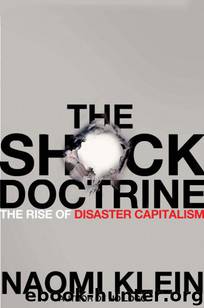The Shock Doctrine: The Rise of Disaster Capitalism by Klein Naomi

Author:Klein, Naomi [Klein, Naomi]
Language: eng
Format: epub, mobi, azw3
Publisher: Metropolitan Books
Published: 2007-09-17T18:30:00+00:00
A Corporate New Deal
Public pronouncements and photo ops aside, Bush and his inner circle had no intention of converting to Keynesianism. Far from shaking their determination to weaken the public sphere, the security failures of 9/11 reaffirmed their deepest ideological (and self-interested) beliefs—that only private firms possessed the intelligence and innovation to meet the new security challenge. Although it was true that the White House was on the verge of spending huge amounts of taxpayer money to stimulate the economy, it most certainly was not going to be on the model of FDR. Rather, Bush’s New Deal would be exclusively with corporate America, a straight-up transfer of hundreds of billions of public dollars a year into private hands. It would take the form of contracts, many offered secretively, with no competition and scarcely any oversight, to a sprawling network of industries: technology, media, communications, incarceration, engineering, education, health care.*
What happened in the period of mass disorientation after the attacks was, in retrospect, a domestic form of economic shock therapy. The Bush team, Friedmanite to the core, quickly moved to exploit the shock that gripped the nation to push through its radical vision of a hollow government in which everything from war fighting to disaster response was a for-profit venture.
It was a bold evolution of shock therapy. Rather than the nineties approach of selling off existing public companies, the Bush team created a whole new framework for its actions—the War on Terror—built to be private from the start. This feat required two stages. First, the White House used the omnipresent sense of peril in the aftermath of 9/11 to dramatically increase the policing, surveillance, detention and war-waging powers of the executive branch—a power grab that the military historian Andrew Bacevich has termed “a rolling coup.”40 Then those newly enhanced and richly funded functions of security, invasion, occupation and reconstruction were immediately outsourced, handed over to the private sector to perform at a profit.
Although the stated goal was fighting terrorism, the effect was the creation of the disaster capitalism complex—a full-fledged new economy in homeland security, privatized war and disaster reconstruction tasked with nothing less than building and running a privatized security state, both at home and abroad. The economic stimulus of this sweeping initiative proved enough to pick up the slack where globalization and the dot-com booms had left off. Just as the Internet had launched the dot-com bubble, 9/11 launched the disaster capitalism bubble. “When the IT industry shut down, post-bubble, guess who had all the money? The government,” said Roger Novak of Novak Biddle Venture Partners, a venture capitalism firm that invests in homeland security companies. Now, he says, “every fund is seeing how big the trough is and asking, How do I get a piece of that action?”41
It was the pinnacle of the counterrevolution launched by Friedman. For decades, the market had been feeding off the appendages of the state; now it would devour the core.
Bizarrely, the most effective ideological tool in this process was the claim that economic ideology was no longer a primary motivator of U.
Download
The Shock Doctrine: The Rise of Disaster Capitalism by Klein Naomi.mobi
The Shock Doctrine: The Rise of Disaster Capitalism by Klein Naomi.azw3
This site does not store any files on its server. We only index and link to content provided by other sites. Please contact the content providers to delete copyright contents if any and email us, we'll remove relevant links or contents immediately.
International Integration of the Brazilian Economy by Elias C. Grivoyannis(111057)
The Radium Girls by Kate Moore(12027)
Turbulence by E. J. Noyes(8047)
Nudge - Improving Decisions about Health, Wealth, and Happiness by Thaler Sunstein(7706)
The Black Swan by Nassim Nicholas Taleb(7128)
Rich Dad Poor Dad by Robert T. Kiyosaki(6632)
Pioneering Portfolio Management by David F. Swensen(6300)
Man-made Catastrophes and Risk Information Concealment by Dmitry Chernov & Didier Sornette(6019)
Zero to One by Peter Thiel(5801)
Secrecy World by Jake Bernstein(4752)
Millionaire: The Philanderer, Gambler, and Duelist Who Invented Modern Finance by Janet Gleeson(4478)
The Age of Surveillance Capitalism by Shoshana Zuboff(4291)
Skin in the Game by Nassim Nicholas Taleb(4248)
The Money Culture by Michael Lewis(4207)
Bullshit Jobs by David Graeber(4190)
Skin in the Game: Hidden Asymmetries in Daily Life by Nassim Nicholas Taleb(4004)
The Dhandho Investor by Mohnish Pabrai(3764)
The Wisdom of Finance by Mihir Desai(3746)
Blockchain Basics by Daniel Drescher(3581)
